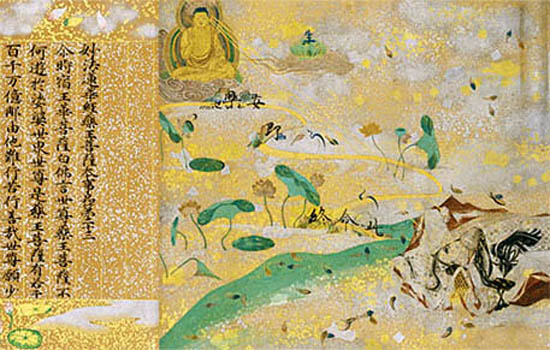《改變歷史的聲音》,臉譜書房
A passionate attachment of one nation for another produces a variety of evils.
1796,喬治華盛頓卸任美國總統的告別演說。
在本書的50篇演講中,本書的編者,最推崇的是Ellie Wiesel 於1999年參加柯林頓在白宮舉辦的千禧之夕的演說:《冷漠的危險》
https://youtu.be/JpXmRiGst4k
https://youtu.be/JpXmRiGst4k
evils (多與惡相關) 翻譯成不幸,有點誤解漢字不幸。弊害或許較對。
- 〈人(の行為など)が〉邪悪な,不道徳な(⇔)
- evil
- 悪行
- evil
- 悪人
- evil
- 邪悪な心
- 2悪魔の,魔力を持った
- evil
- 悪霊
- 3害を与える,有害な
- evil laws
- 悪法
- evil
- 有害な考え
- 3a縁起の悪い,不吉な;不幸[不運]な
- evil []
- 凶報
- evil []
- いやなことが起こりそうな日[時]
- evil
- 運悪く,不幸にも
- evil
- 不運な目にあう
- 4〈においなどが〉不快な,いやな
- evil
- 悪臭
━━[名]
- 1U悪,邪悪;悪行,悪事
- evil
- 善悪
- evil
- 悪事を働く
- 2C〔通例~s〕害悪,弊害;U不運,不幸
- evils
- 社会悪
- evils drugs
- 麻薬の弊害
***
古典名著的翻譯比較,除正文之外,註解的比較也很有意思。
以《平家物語 (Heike Monogatari )》開頭文句為例子,可比較的版本:周作人、鄭清茂; Helen Craig McCullough's、 Edward G. Seidensticker's
有空補
祇園精舎:平家物語巻第一

(平家納経から)
~祇園精舎の鐘の声、諸行無常の響あり。娑羅双樹の花の色、盛者必衰のことはりをあらはす。おごれる人も久しからず、ただ春の夜の夢のごとし。たけき者も遂にはほろびぬ、ひとへに風の前の塵に同じ。
http://blog2.hix05.com/2015/12/post-2134.html
The theme of impermanence (mujō) is captured in the famous opening passage:
The 4-character expression (yojijukugo) "the prosperous must decline" (盛者必衰jōshahissui) is a phrase from the Humane King Sutra, in full "The prosperous inevitably decline, the full inevitably empty" (盛者必衰、実者必虚 jōsha hissui, jissha hikkyo).
The second concept evident in the Tale of the Heike is another Buddhist idea, karma. The concept of karma says that every action has consequences that become apparent later in life. Thus, karma helps to deal with the problem of both moral and natural evil. Evil acts in life will bring about an inevitable suffering later in life. This can be seen clearly with the treatment of Kiyomori in The Tale of the Heike, who is cruel throughout his life, and later falls into a painful illness that kills him.
wikipedia
平家物語(日語:平家物語/へいけ ものがたり Heike Monogatari),成書於13世紀(日本鎌倉時代)的軍記物語,作者不詳,記敘了1156年-1185年這一時期源氏與平氏的政權爭奪。西方人將之比喻為「日本的《伊里亞德》」。[1]
全書共192節,曾由日本的琵琶法師進行了生動的演繹。
開頭文句原文[編輯]
| 原文 | 譯文 |
|---|---|
平家物語 巻第一
第一句 祇園精舎 ぎをんしやうじや 祇園精舎の鐘の声 諸行無常の響きあり 娑羅双樹の花の色 盛者必衰の理を顕す 驕れる人も久しからず 唯春の夜の夢の如し 猛き者も終には亡びぬ 偏に風の前の塵に同じ[2] |
祇園精舍的鐘聲,
有諸行無常的聲響, 沙羅雙樹的花色, 顯盛者必衰的道理。 驕奢者不久長, 只如春夜的一夢, 強梁者終敗亡, 恰似風前的塵土。
祇園精舍鐘聲響,
訴說世事本無常; 沙羅雙樹花失色, 盛者必衰若滄桑。 驕奢主人不長久, 好似春夜夢一場, 強梁霸道終殄滅; 恰如風前塵土揚。 |





沒有留言:
張貼留言